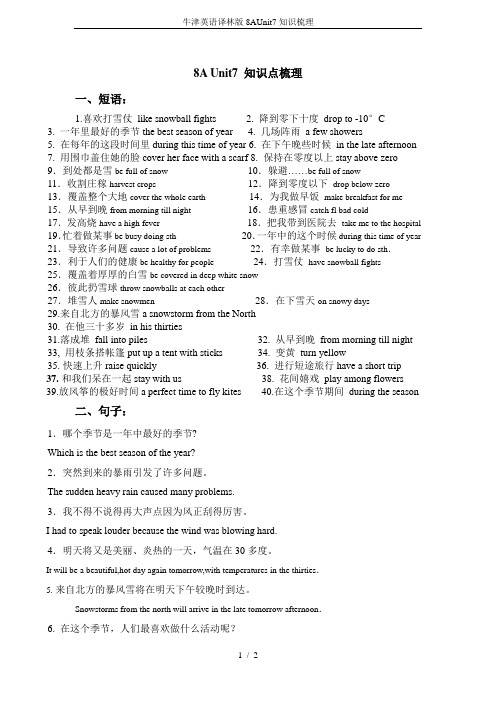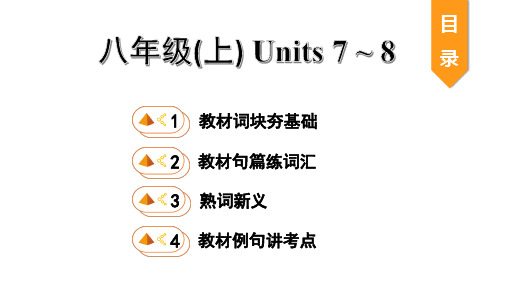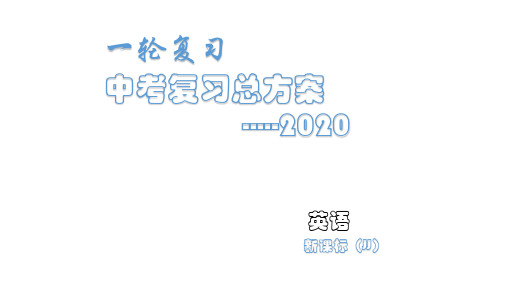8A Units7-8
- 格式:doc
- 大小:52.50 KB
- 文档页数:2

8A Unit7 知识点梳理一、短语:1.喜欢打雪仗like snowball fights2. 降到零下十度drop to -10°C3. 一年里最好的季节the best season of year4. 几场阵雨a few showers5. 在每年的这段时间里during this time of year6. 在下午晚些时候in the late afternoon7. 用围巾盖住她的脸cover her face with a scarf8. 保持在零度以上stay above zero 9.到处都是雪be full of snow10.躲避……be full of snow11.收割庄稼harvest crops 12.降到零度以下drop below zero 13.覆盖整个大地cover the whole earth 14.为我做早饭make breakfast for me 15.从早到晚from morning till night 16.患重感冒catch fl bad cold17.发高烧have a high fever 18.把我带到医院去take me to the hospital 19.忙着做某事be busy doing sth 20.一年中的这个时候during this time of year 21.导致许多问题cause a lot of problems 22.有幸做某事be lucky to do sth.23.利于人们的健康be healthy for people 24.打雪仗have snowball fights25.覆盖着厚厚的白雪be covered in deep white snow26.彼此扔雪球throw snowballs at each other27.堆雪人make snowmen 28.在下雪天on snowy days29.来自北方的暴风雪a snowstorm from the North30. 在他三十多岁in his thirties31.落成堆fall into piles 32. 从早到晚from morning till night 33, 用枝条搭帐篷put up a tent with sticks 34. 变黄turn yellow35.快速上升raise quickly 36. 进行短途旅行have a short trip 37.和我们呆在一起stay with us 38. 花间嬉戏play among flowers39.放风筝的极好时间a perfect time to fly kites 40.在这个季节期间during the season二、句子:1.哪个季节是一年中最好的季节?Which is the best season of the year?2.突然到来的暴雨引发了许多问题。





8A Unit 7-8 知识要点小结Class:__________ Name:_________一、重点单词(词性变化)1. memory (n.)记忆力;回忆--(v.)memorize 记住2. lose (v.)丧失;失去--过去式/过去分词lost --(n.)loser输家--(n.) loss 损失;遗失3. improve (v.) 改进;改善-- (n.) improvement改进;进步4. spelling (n.)拼写--(v.)spell 拼写5. similar (adj.)相像的;类似的--(n.)similarity 类似;相似点6. manager (n.) 经理--(v.)manage经营;管理7. notice. (n.) 通告notice (v.) 通知,注意8. competition (n.) 比赛compete(v.) 竞争9. confidently (adv.) 自信地-- (adj.) confident 自信的-- (n.) confidence 自信10.winner (n.)优胜者-- (v.) win 赢–(过去式/过去分词) won11.speech (n.) 演说;发言-- (v.)speak 说;讲12.suggest (v.) 建议-- (n.) suggestion可数13.hide (v.) 隐藏–(过去式) hid --(过去分词)hiddenmunicate (v.) 交流-- (n.) communication 沟通;交流15.choose (v.) 选择--(过去式)chose -- (过去分词)chosen – (n.) choice 选择二、同义词(同义词组)1. silly = stupid;foolish;dull2. mind = brain3. method = way4. wallet = purse5. trouble = difficulty/problem6. unless = if..not7. improve = make ....better 8. whole = complete, all;9. look out =watch out, be careful; 10. whenever = at any time11. attack = hit sb. or kill sb.12. hide = to put sth. in a secret place where someone can not see;13. in my opinion = from my point of view = I think14. above all = the most important 15. look out = be careful = take care 小心;当心16. the whole school = all the school整个学校三、重点短语1. 提高某人的记忆力improve one’ s memory2. 有好的记忆力have a good memory3. 把...添加到add...to4. 帮助某人做某事help sb.(to) do sth.5. 发生take place6. 做某事的方法1) a way to do sth. 2)a method for doing sth.7. 在脑海里想象imagine ...in one’ s mind8. 解决,算出,实现work out9. 值得一做be worth doing10. 做某事有困难1)have trouble doing sth.2)have trouble with sth. 11. 水循环the water cycle12. 提取take out13. 涌出pour out14. 保持放松stay relaxed15. 过着健康的生活live a healthy life16. 寻宝游戏treasure hunt17. 上演put on18. 公开地in public19. 最好做某事had better do sth.20. 建议某人做某事advise sb. to do sth=advise doing sth.=suggest doing sth.21. 依我看In my opinion22. 做演讲give a speech (to)。
8A Unit 7---8 知识点训练卷一.词汇A)请根据题中空格后的中文提示、英文释义或音标,写出句中所缺单词,使句子通顺。
1. The girls are often afraid of __________ ( the loud noise following lightning ) in summer .2.The car________ (事故)killed many people.3. People looked at each other in________ (恐惧).5. Today the _________(温度) is 28℃~20℃. It is quite warm.6. I know the result is _________ because she is unhappy.7. In winter, we like making _________ (雪人) and use carrots for their noses.B) , 每词限用一次。
2. After a day’s hard work, he fell ________ soon.3. On such a _________ night, everything seemed to be so nice.4. I felt _________ and my heart was beating fast.5. The frightened people looked at each other in fear and then ran in all _____________.C)1.2.I have to go now. Someone ________ for me at the school gate.3.Can you see the butterflies _________ among flowers.4.We are all busy ________ ourselves tents by the river.5.When wind and rain come, don’t forget _________ all the doors and windows.二.单项选择( ) 1. They were rowing boats ________ we were having dinner.A. whenB. asC. whileD. during( ) 2. I was very angry with John; he just _________ when I spoke to him.A. isn’t listeningB. hasn’t listenedC. didn’t listenD. wasn’t listening( ) 3.A true friend can see the pain(痛苦) in your eyes ______ everyone else believes the smile on your faceA. whileB. becauseC. beforeD. until( ) 4. Many Chinese students think science subjects are _______ foreign languagesA. more difficult asB. less difficult thanC. much difficult thanD. so difficult as( ) 5. The accident happened ______ a cold winter early morning.A. inB. atC. onD. for( ) 6. –What did the teacher say just now? ---Sorry, I didn’t hear it . I ____ out of the window.A. lookB. lookedC. am lookingD. was looking( ) 7. ---_____ do you live from your school? ---- About five minutes’ ride.A. How longB. How farC. How oftenD. How soon( ) 8. The floor is very dirty. Will you please _________ ?A. to mop up itB. mop up itC. to mop it upD. mop it up( ) 9. ---It’s too hot.. Would you mind my _____ the window? --____. Do it as you like.A. to open; OKB. opening; Certainly notC. opening; Of courseD. open; Good idea( ) 10. When I passed the classroom, I heard a girl _______ in it.A. singB. singsC. sangD. singing( )11.---_______weather! Shall we go to the park? ---_______. Let’s go.A. What a fine; Sounds greatB. What fine; Sounds greatC. What a fine; You’re rightD. What fine; You are right( )12. I don’t like this kind of music. It always makes me feel_______.A. excitedB. happyC. relaxedD. bored( )13. ----If it ________ sunny tomorrow, I ______ fishing in South Lake.--- It’s a good idea. Can I join you?A. is; goB. will be; goC. is; will goD. will be; will go( )14.She is an _____ girl. She always speaks to others _______.A. polite, politelyB. impolite, rudelyC.impolite, politelyD.polite, impolitely( )15. -----Do you mind my opening the window? -----_______. It’s too cold outside.A.Never mindB. Not at allC. You’d better notD. Sure三.完形填空A teenage girl couldn’t stand(忍受)her family rules, so she left home.She wanted to be a star and became famous. But she had a little education and 1 years later, she had to ask for food on the street for a living. Now her father has died. Her mother is an old woman. But she is still 2 her daughter. She has been to every corner of the city. Everywhere she goes, she 3 a big photo of her daughter on the wall. At the lower part of the photo she writes, “I still love you …Come back home!”One day, the daughter saw one of the photos. She was so surprised that she couldn’t believe her 4 . “Is that me?” She moved 5 and read the words, “I still love you…” She cried. She couldn’t wait 6 back home. When she got home, it was early morning. She pushed the door. The door opened itself. She rushed to the bedroom at once. Her mother was sleeping there. She 7 her mother up, “It’s me! Your daughter is back home!” The mother and daughter looked at each other with excitement, full of happy tears. The daughter asked, “8 is the door unlocked? A thief could get in.” The mother answered softly, “The door has never locked9 you left. We miss you all the time. We believe that you’ll come back some day.”As everyone knows, parents love their children forever. Children should also understand their parents and share their happiness, sadness, even everything with their parents. 10 this way, both parents and children can be happy.( )1. A. a little B. a few C. much D. more( )2. A. looking for B. looking after C. looking at D. looking up( )3. A. sets on B. puts up C. cuts up D. makes up( )4. A. eyes B. ears C. nose D. head( )5. A. farther B. further C. closer D. away( )6. A. going B. go C. to gone D. to go( )7. A. wake B. wakes C. woke D. waking( )8. A. what B. who C. when D. why( )9. A. since B. for C. before D. unless( )10. A. with B. in C. by D. on四、阅读理解Little Tommy was doing very badly in math. His parents had tried everything—tutors (家庭教师), cards, special learning centers—in short, everything they could think of. Finally they took Tommy to a catholic (天主教的) school.After the first day, little Tommy came home with a very serious look on his face. He didn’t kiss his mother hello. Instead, he went straight to his room and started studying. Books and papers were spread (铺开) out all over the room and little Tommy was hard at work. His mother was surprised. She called him down to dinner and as soon as he finished eating, he went back to his room, without a word. In no time he was back hitting the books as hard as before. This went on for some time, day after day while the mother tried to understand what was happening.Finally, little Tommy brought home his report card. He quietly put it on the table and went up to his room and hit the books. His mom looked at it and to her surprise, little Tommy got an A in math. She could no longer hold her curiosity (好奇心). She went to his room and asked, “Son, what was it? Was it the nuns (修女)?”Little Tommy looked at her and shook his head, “No. ”“Well then,” she asked again. “WHAT was it?”Little Tommy looked at her and said, “Well, on the first day of school, when I saw that man nailed (钉) to the plus sign (加号), I knew they weren’t joking. ”( )1. Why did Tommy’s parents send him to a catholic school?A. Because he could eat well there.B. Because he could earn more about nuns.C. Because his parents didn’t want him to learn math any more.D.Because his parents wanted him to do better in his math.( )2. Tommy’s mother felt surprised that his son _______.A. was still the same as usualB. ate so much at dinnerC. kissed her hello after schoolD. worked hard but said little( )3. “Hitting the books” means “_______” in Chinese.A. 用功B. 捶书C. 发泄D. 振作( )4. The last sentence in the passage shows that _______.A. Tommy felt sorry for the mailB. Tommy liked playing jokes on others.C. Tommy didn’t lik e the plus signD. Tommy was afraid of being nailed( )5. From the passage, we can infer (推断) that _______.A. teachers should be strict with their studentsB. mistaking (误解) might do good sometimesC. a catholic school is much better than other onesD. nuns are good at helping children with their math 五.短文填空There were three old teachers at the railway s___1_____. They were taking happily. The train arrived, but they didn’t notice. Then the conductor(列车长) shouted, “G_ 2____ on the train and take the seats,please”The teachers heard the conductor and rushed for the train. T__3___ of them got on the train b___4_____ itmoved. The third one didn’t get on the t_____5___. It was Mr Green. He looked worried. One of his studentswas at the station. He t___6____ to comfort(安慰) the teacher. It wasn’t really b___7__ ,sir,” said the student. “Two out of three c____8____ the train. That’s quite good, you know.”“I know, “ the teacher said, “But it wasm___9___ train. My friends only came to s___10____ goodbye to me”。
Unit 7-8 单元知识点归纳及提升练习Unit 7 Will people have robots?I .词组1. I think 我认为2. study at home 在家学习3. 在电脑上__________4.在纸上__________5. 活到200岁_____________6. in 100 years___________7. fewer people 更少的人8. free time 空闲时间9. use the subways less 少用地铁 10.(be )in danger 在危险中 11. move to other planets 搬到其他星球 12. 住在地球上______________ 13. 尽力参与.... ____________ 14. 世界和平______________ 15. space station 宇宙空间站 16.fly rockets to the moon________________ 17. 制造汽车________________ 18. over and over again________________ 19. 做这样的工作_______________ 20. 在将来______________21. 变厌烦______________ 22. 与.....一样_______________ 23. 醒来/唤醒_____________ 24. 不同意某人_____________ 25. hundreds of ________________26. 倒下/落下_______________ 27.look for 寻找_______________ 28. 似乎不可能_____________ 29. which side 哪一方? 30. as a reporter____________ 31.keep a bird 养一只鸟 32. take a holiday 度假II. 习惯用法、搭配1. will+动词原形 将要做2. There will be+主语+其他 将会有….3. fewer/more + 可数名词复数 更少/更多…4. less/more + 不可数名词 更少/更多5. have to do sth 不得不做某事6. play a part in doing sth 参与做某事7. help sb. with sth. 帮助某人做某事 8. There is/are + sb. + doing sth 有(某人)正在做… 9. such + 名词(词组) 如此10. try to do sth. 尽力做某事11. make sb. do sth. 让某人做某事12. agree with sb. 同意某人的意见13. It is+形容词+for sb+ to do sth 做某事对某人来说…14. Sb. spend some time/money (in) doing sth 某人花时间钱Sb. spend some time/money on sth.It takes sb some time/money to do sth. 花费某人时间/钱Sth takes sb some time/moneyIII .重要句子:1.What will the future be like? ________________________Cities will be more polluted. And there will be fewer trees.城市会更受污染。
英语八年级上册Units7-8导学案班级姓名一、教师寄语:Look on the light side.要看到光明的一面。
二、学习目标1. 单词:详见中考丛书2.句型: How do you make a banana milk shake? How many bananas do we need ?How much milk do we need ? How was your school tripDid you win that haWere there any sharks? When is…?It’s….3:学会使用how many和how much分别对可数名词和不可数名词的量提问.4学习一般过去时及There be句型的一般过去时知识目标:三、教学重点和教学难点:可数名词和不可数名词的运用以及对他们量的提问。
如何描述过程。
规则和不规则动词的过去式四、学习过程学习过程一、预习导学及自测(一)、翻译下列词组:1. 昨天下午_______2. 前天_______3. 昨晚_________4. 上个月_________5. 去年夏天________6. 看录像_________7. 整天_________8. 开车兜风_________9. 获得奖金_________ 10. 买纪念品_________(二)按要求写出下列各词:1. visit____(过去式)2. photo____(复数)3. take___(反义词)4. put____(过去式)5. pour___(现在分词6. win____(过去式)7. gift____(同义词)8. fun____(形容词)9. begin___(同义词10. wild____(比较级)11. athletic____(比较级)15. she___(名词性物主代词)16. sick____(同义词)17. right___(同音词)18. foot____(复数)19. they_____(宾格)20. knife___(复数)二、自主学习1. win和beat有区别,二者都有“赢得;获得;胜出”之意,但稍有不同win win后跟的宾语,一般是比赛、游戏、奖品、奖金、辩论、战斗等名词。
beat beat后跟的宾语,是人或由人组成的团队等。
beat的过去式仍是beat。
2. end的用法:end n. 结束;结尾v. 结束in the end 最后by the end of 到……末为止at the end of 在……的末尾;在……的尽头end with 以……结束The party ended with a song.3. That sounds interesting. 那听起来很有趣。
此句用来对他人的陈述、建议等表示欣赏且有兴趣时的一句话。
此句中sound 是系动词,意为“听上去;听起来”,后跟形容词作表语,有时也跟“like+名词”。
—Let’s go to the movie.。
— That sounds interesting. That sounds like a busy day off..4. sleep late 睡过头;起得晚,相当于get up late。
I slept late on Sunday morning. go to be late 睡得晚5. Did you have fun camping? have fun 玩得快乐过得愉快,= have a good/great/nice/ wonderful time, enjoy oneself 。
have fun +v-ing 做某事快乐The boy often has fun watching TV at home.6. Luckily, we brought our umbrellas and raincoats, so we didn’t get wet.本句是由so连接的并列句。
luckily adv.幸运地,常修饰动词,形容词,副词或句子。
Luckily, the boy passed the exam. lucky adj. 幸运的. luck n. 幸运Good luck to you. 祝你走运。
7 对数量进行提问时,how many后接可数名词复数;how much后接不可数名词。
三、合作探究none和no one的用法区别:none 既可指人,也可指物可与of 连用,谓语动词可以是单数也可以是复数,具体指什么人或事物,一般用来回答“How many + 名词复数”,“Howmuch +名词”以及含有“any+名词“的疑问句。
no one 相当于nobody,只指人。
用作主语时,谓语用单数,后面不能跟of短语,常用来回答who 和含有anyone/ anybody引起的疑问句。
四、拓展创新off 的用法以及短语:off adj. 休息;不工作,常用在名词后。
day off (因病或节假日)休息;不工作;不上学He is ill, the teacher gives him one day off.off adv. 离开You must be off soon. ask for a day offI have something to do, I want to ask for a day off.on one’s day off 在某人的休息日On my last day off, I went to climb Mountain Tai.have a day off 休假一天On March 8th, women often have a day off.take off 脱下;起飞It’s hot. Please take off your coat.turn off 关上Please turn off your T V. Let’s go for a walk.五、典型例题解析1.Don’t ____ too much TV, It’s bad for your eyes.A. watchB. watchedC. watchingD. to watch<点拨>本句是否定祈使句,don’t后接动词原形,故排除B, C, D三项。
<答案> A 2.—Please come ____ the room. It’s raining hard outside.—Thank you.A. overB. outC. intoD. on<点拨> come over意为“顺便来访”,接介词to之后,再加地点宾语,故排除;come out 加地点名词时要先加介词of,排除;come on意为“加油;过来”,不符合句意;句意为“外面雨下得很大,请进屋吧。
谢谢。
”故选C项。
<答案> C3. Do you know how ____ the blender?A. openB. to openC. turn onD. to turn on<点拨>打开果汁机用turn on,排除A, B两项;疑问词后常接不定式,故排除C项五、4. After two hours, we arrived ____ the top of the mountain.A. atB. onC. inD. into<点拨>句意为“两小时后,我们到达了山顶”。
arrive是不及物动词,后接宾语时要接介词in或at。
“山的顶部”是一个小地方,故用介词at。
<答案> A5. First, cut up two apples, then put them into the blender. ____ turn on the blender.A. AndB. NextC. FirstD. Finally<点拨>根据句中的first,then可知,空内要表达的是最后一点,故用finally。
其他三项不合句意。
<答案> D6. That’s a ____ for a great beef sandwich! A. way B. recipe C. idea D. bowl<点拨> idea首音素是元音,用不定冠词an修饰,故排除C项;a way to …意为“……的方法”,排除;a bowl of意为“一碗……”,也排除。
而 a recipe for意为“……的菜谱”。
<答案> B7. ____ there any water in the cup just now?A. IsB. WasC. WereD. Are<点拨> just now 意为“刚才”,是一般过去时态的标志,故排除A, D两项;any water 是主语,故谓语用单数形式,排除C项。
<答案> B8. Ann _____ out with her mother last Sunday.A. hangB. hangsC. hungD. hanged<点拨> 由last Sunday可知时态用过去时,故排除A, B两项;作“绞死;吊死”讲时,hang的过去式是hanged,故排除;作“逗留;徘徊”时,过去式为hung。
<答案> C9. In the football game, we ____ the students from Class 9 and ____.A. beat; won first prizeB. beat; won the first prizeC. beat; win first prizeD. won; won first prize<点拨> 第一空后是the students,指人,故用beat,排除D项;“获得一等将”应为win first prize,win的过去式为won,故排除B, C两项。
<答案> A10. —Why are you late again, Grace? — Sorry, sir. I ____ again.A. went to bed earlyB. slept lateC. got up earlyD. had nothing<点拨>A项意为“上床睡觉早”B项意为“睡过头”;C项意为“起床早”D项意为“没有什么事”。
句意为“格雷斯,你为什么又迟到了?对不起先生,我又睡过头了。
”<答案> B11. —Did they have fun ____ the dolphin show? —Yes, they did.A. watchB. watchedC. watchingD. to watch<点拨> have fun后接动词时,要接动词的-ing形式。